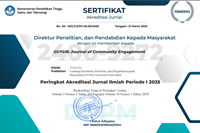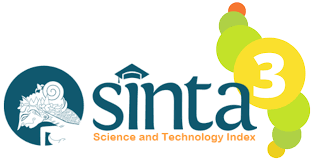Akhtar, H., Hasanati, N., & Istiqomah, I. (2019). GAME-BASED LEARNING: TEACHERS’ ATTITUDE AND INTENTION TO USE QUIZIZZ IN THE LEARNING PROCESS. Iceap 2019. https://doi.org/10.26499/iceap.v0i0.202
Angelini, M., Muñiz, R., & Lozano, A. C. (2023). Virtual simulation in teacher education across borders. Educ. Inf. Technol., 29, 10551–10569. https://doi.org/10.1007/s10639-023-12244-z
ARIANTI, A. (2019). Peranan Guru Dalam Meningkatkan Motivasi Belajar Siswa. DIDAKTIKA : Jurnal Kependidikan, 12(2), 117–134. https://doi.org/10.30863/didaktika.v12i2.181
Asmara, A. H. D. (2020). Fostering Religious Education for Transformation in Indonesia: Dialogue with Transformative Learning Theory. 2, 119–148. https://doi.org/10.24071/JAOT.2020.020201
Astindari, T., & Hasanah, N. (2024). PEMANFAATAN APLIKASI QUIZIZZ SEBAGAI MEDIA GAME BASED LEARNING (Dalam Meningkatkan Konsentrasi Siswa Dalam Belajar Matematika Pada Matei Eksponen Di Mts Fathus Salafi Putri Mangaran Situbondo). Consilium: Education and Counseling Journal. https://doi.org/10.36841/consilium.v4i2.4674
Capuno, J. G. (2023). Quizziz: A Game-based Formative Assessment Tool for Enhancing Students Self-Regulated Learning. International Journal of Social Learning (IJSL). https://doi.org/10.47134/ijsl.v3i3.206
Fitriyadi, N., & Wuryandani, W. (2021). Is educational game effective in improving critical thinking skills? Jurnal Prima Edukasia. https://doi.org/10.21831/JPE.V9I1.35475
Hajar, S., My, N., & Arsyad, N. F. (2024). Utilizing Quizizz for Game-Based Learning in Elementary Science Education. Journal of Education and Computer Applications. https://doi.org/10.69693/jeca.v1i1.2
Hariyastuti, A. (2020). Improving Learning Outcomes by Using Quizizz Educational Game Assisted Learning Video Media. Social, Humanities, and Educational Studies (SHEs): Conference Series. https://doi.org/10.20961/SHES.V3I3.45832
Herlinawati, H., Marwa, M., Ismail, N., Junaidi, Liza, L., & Situmorang, D. D. B. (2024). The integration of 21st century skills in the curriculum of education. Heliyon, 10. https://doi.org/10.1016/j.heliyon.2024.e35148
Inayati, N., & Waloyo, A. A. (2022). The influence of Quizziz-online gamification on learning engagement and outcomes in online English language teaching. Journal on English as a Foreign Language. https://doi.org/10.23971/jefl.v12i2.3546
Khong, H. D. T., & Nguyen, T. P. (2022). Sustainable Teacher Education and Professional Development. Tạp Chí Giáo Dục, 6(Special Issue), 1–5. https://doi.org/10.52296/vje.2022.184
Liang, X. (2024). Research on the Teacher Education Training System Under the Perspective of Deep Learning. Journal of Educational Research and Policies. https://doi.org/10.53469/jerp.2024.06(06).10
Liza, K., & Andriyanti, E. (2020). Digital literacy scale of English pre-service teachers and their perceived readiness toward the application of digital technologies. Journal of Education and Learning (EduLearn). https://doi.org/10.11591/EDULEARN.V14I1.13925
Maassen, B., Glatz, T., Borleffs, E., Martínez, C., & De Groot, B. (2025). Digital game-based learning for dynamic assessment and early intervention targeting reading difficulties: Cross-linguistic studies of GraphoLearn. Clinical Linguistics & Phonetics, 1–26. https://doi.org/10.1080/02699206.2025.2452979
Marsuki, M., Suwono, H., & Slamet, A. V. (2020). Development of digital learning media based on android games with joyful inquiry model to increase science literacy skills for second year students of junior high school in subject matter of vibration. 28TH RUSSIAN CONFERENCE ON MATHEMATICAL MODELLING IN NATURAL SCIENCES. https://doi.org/10.1063/5.0000565
Mfreke, Isong, M., Sheik, I., & Bassey. (2020). Teaching and Learning with Media Technology. 7, 236–300. https://consensus.app/papers/teaching-and-learning-with-media-technology-mfreke-isong/3c2d26d2b8945cdca8119707893c1441/
Milawati, & Sholeh, M. (2020). Teacher’s Readiness in Using Digital Technology for Learning in Samarinda City High School. 321–324. https://doi.org/10.2991/assehr.k.200130.064
Mishra, R., Reddy, G., & Pathak, H. (2021). The Understanding of Deep Learning: A Comprehensive Review. Mathematical Problems in
Engineering, 2021, 1–15. https://doi.org/10.1155/2021/5548884
Ningrum, T., & Suherman, D. D. S. (2020). Improving Digital Literacy Competence for Teachers through Bimtek for Making Media and Evaluating Online Learning for Elementary Schools. JMAEL: Journal of Management, Administration and Educational Leadership. https://doi.org/10.51376/jmael.v1i4.179
Olsen, M., Andersen, P.-A., & Granmo, O.-C. (2018). Deep RTS: A Game Environment for Deep Reinforcement Learning in Real-Time Strategy Games. 2018 IEEE Conference on Computational Intelligence and Games (CIG), 1–8. https://doi.org/10.1109/CIG.2018.8490409
Ouyang, R.-G., Long, Y., Zhang, J., & Cao, Z. (2023). Interventions for improving self-efficacy in patients after stroke based on self-efficacy-related principles of Bandura’s cognition theory: a systematic review and meta-analysis. Topics in Stroke Rehabilitation, 30, 820–832. https://doi.org/10.1080/10749357.2023.2172832
Ramadhan, S., Sukma, E., & Indriyani, V. (2019). Teacher competence in utilizing digital media literacy in education. Journal of Physics: Conference Series, 1339. https://doi.org/10.1088/1742-6596/1339/1/012111
Razali, N., Nasir, N., Ismail, M., Sari, N., & Salleh, K. (2020). Gamification Elements in Quizizz Applications: Evaluating the Impact on Intrinsic and Extrinsic Student’s Motivation. IOP Conference Series: Materials Science and Engineering, 917. https://doi.org/10.1088/1757-899X/917/1/012024
Rusydiyah, E., Purwati, E., & Prabowo, A. (2020). HOW TO USE DIGITAL LITERACY AS A LEARNING RESOURCE FOR TEACHER CANDIDATES IN INDONESIA. 39, 305–318. https://doi.org/10.21831/cp.v39i2.30551
Safi’i, I., Tarmini, W., & Sobri, S. (2020). Pelatihan Implementasi Pembelajaran Berorientasi pada Keterampilan Berpikir Tingkat Tinggi bagi Guru-Guru SMP Negeri 7 Depok, Jawa Barat. Jurnal Pengabdian Pada Masyarakat, 5. https://doi.org/10.30653/002.202052.532
Soleha, S., & Miftahus, S. (2020). PENGARUH MOTIVASI DAN DISIPLIN BELAJAR TERHADAP HASIL BELAJAR SISWA. Jurnal Bimbingan Dan Konseling Terapan, 4(1), 103–118. https://doi.org/10.30598/jbkt.v4i1.1452
Suprapto, N., Sukarmin, S., Puspitawati, R., Erman, E., Savitri, D., Ku, C.-H., & Mubarok, H. (2021). Research trend on technological pedagogical content knowledge (TPACK) through bibliometric analysis (2015-2019). International Journal of Evaluation and Research in Education, 10. https://doi.org/10.11591/IJERE.V10I4.22062
Tang, H. (2024). Construction of vocational undergraduate education teacher team based on deep learning. Journal of Computational Methods in Science and Engineering, 24, 201–216. https://doi.org/10.3233/JCM-237041
Tembine, H. (2020). Deep Learning Meets Game Theory: Bregman-Based Algorithms for Interactive Deep Generative Adversarial Networks. IEEE Transactions on Cybernetics, 50, 1132–1145. https://doi.org/10.1109/TCYB.2018.2886238
Wang, H. (2024). Artificial Intelligence Gamers Based on Deep Reinforcement Learning. Highlights in Science, Engineering and Technology. https://doi.org/10.54097/p9tv1494
Yafie, E., Haqqi, Y. A., Kustiawan, U., Astuti, W., Boedi, D., & Ilhami, B. S. (2020). The Effect of Teacher Competency Training on High Order Thinking-Based Learning. Journal of Early Childhood Care and Education. https://doi.org/10.26555/jecce.v2i2.1293
Yakubu, G., Ahmed, A. A., & Iyasco, M. D. (2025). THE IMPACT OF CONSTRUCTIVITIST LEARNING THEORIES ON CURRICULUM DESIGN. International Journal of African Sustainable Development Research. https://doi.org/10.70382/tijasdr.v07i2.024
Yannakakis, G., Liu, J., Snodgrass, S., Risi, S., Togelius, J., & Khalifa, A. (2020). Deep learning for procedural content generation. Neural Computing and Applications, 33, 19–37. https://doi.org/10.1007/s00521-020-05383-8
Zhang, X., & Cao, Z. (2021). A Framework of an Intelligent Education System for Higher Education Based on Deep Learning. Int. J. Emerg. Technol. Learn., 16. https://doi.org/10.3991/IJET.V16I07.22123
 (Sekolah Tinggi Keguruan dan Ilmu Pendidikan PGRI Situbondo)
(Sekolah Tinggi Keguruan dan Ilmu Pendidikan PGRI Situbondo) 









.png)
